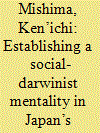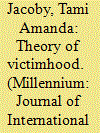|
|
|
Sort Order |
|
|
|
Items / Page
|
|
|
|
|
|
|
| Srl | Item |
| 1 |
ID:
146634


|
|
|
|
|
| Summary/Abstract |
From a historical perspective, the welfare net in Japan was established from above without democratic participation and expanded only slowly. This expansion in many cases was aimed at enhancing national cohesion, especially during war time. During the current neoliberal era, Japan’s paternalistic welfare state has been able to put into practice the dismantling of national pension and health-care systems without the need for any theoretical re-orientation. In response, counter-publics have engaged in protest and resistance. By doing so, the victims of modernization and those who are socially weak and disadvantaged in multiple ways are able to regain their self-esteem and personal integrity.
|
|
|
|
|
|
|
|
|
|
|
|
|
|
|
|
| 2 |
ID:
096874


|
|
|
| 3 |
ID:
139768


|
|
|
|
|
| Summary/Abstract |
Human rights have become a central aspect of global peace-building strategies, and are often pursued through instruments of transitional justice. In this paper I focus on the role of truth and reconciliation commissions (TRCs) for human rights in post-conflict settings and argue that the global politics of reconciliation, which is supposed to unveil the ‘truth’ about, and help to overcome, past human rights violations, serves as a vehicle that brings the human rights language to post-conflict settings. While this might be expected to be empowering for the local people, the Sierra Leonean case suggests that, here, the particular human rights narrative promoted by the TRC had two potentially depoliticising effects: first, by narrating the past conflict as a series of human rights violations while downplaying the political motives and claims that kept it going; second, by constituting the local people as the victims and perpetrators of past human rights violations who are above all in need of reconciliation and healing. The TRC’s human rights narrative thereby overwrote other subject positions held by the people, such as those of soldier, rebel, or civilian. It also neutralised the political claims held by these subjects and replaced them with the therapeutic need for reconciliation and healing.
|
|
|
|
|
|
|
|
|
|
|
|
|
|
|
|
| 4 |
ID:
123282


|
|
|
|
|
| Publication |
2013.
|
| Summary/Abstract |
This paper develops a conceptual framework for increasing understanding of how teachers can contribute to a sustainable bullying-free learning environment in schools. Based on a review and analysis of extant literature, the paper argues for the facilitating roles of mindful social emotional learning implementation and teacher-student relationship quality in building and sustaining a bullying-free learning environment, which can impact the victim of a bullying act, the bully and their peers. The analysis leads to the research and practical implications that conclude the paper.
|
|
|
|
|
|
|
|
|
|
|
|
|
|
|
|
| 5 |
ID:
141201


|
|
|
|
|
| Summary/Abstract |
What (and who) is a victim? In contemporary violent conflicts, the construction of grievance-based identity is a fundamentally contested process as the lines between victim and perpetrator are blurred by ongoing cycles of belligerence and retribution. As victims are incorporated into broader political campaigns, it becomes nearly impossible to separate the victim from the politics. The ubiquity of victims in international politics is a serious challenge to International Relations theory as categories of victim and perpetrator are generally treated as ‘prior or external to analysis’ instead of as propositions for further inquiry. This article formulates a political theory of victimhood driven by a distinction between victimisation as an act of harm perpetrated against a person or group, and victimhood as a form of collective identity based on that harm. It proposes a sequence of five stages that victims experience from the act of victimisation to the recognition of victim-based identity: (1) structural conduciveness, (2) political consciousness, (3) ideological concurrence, (4) political mobilisation and (5) political recognition. The article explores the stages with concrete examples and offers three main challenges for future research. First, as an identity, victimhood is more prominent in societies that recognise justice. Second, victimhood accompanies struggles for recognition. Third, victim rivalries obfuscate straightforward analysis of victimhood in conflict zones.
|
|
|
|
|
|
|
|
|
|
|
|
|
|
|
|
| 6 |
ID:
124306


|
|
|
|
|
| Publication |
2013.
|
| Summary/Abstract |
Any meaningful attempt to understand how the Soviet system evolved and 'worked' must take into account not only those who conformed ideologically, but also those who actively embraced alternative frameworks of meaning. This paper centres on the experience of a young factory worker, Petr Terekhovich, who, in the mid-1920s, abandoned 'godlessness' to devote himself to the charismatic lay preacher, Brother Ioann Churikov, and to a highly ascetic, scripture-based form of sobriety. Drawing largely on archival materials, it seeks to understand Terekhovich's story as a case study of religious struggle, belief and activism, an account of persecution by atheist officials, and ultimately, a narrative of resistance, spiritual freedom and self-determination under Soviet rule.
|
|
|
|
|
|
|
|
|
|
|
|
|
|
|
|
|
|
|
|
|